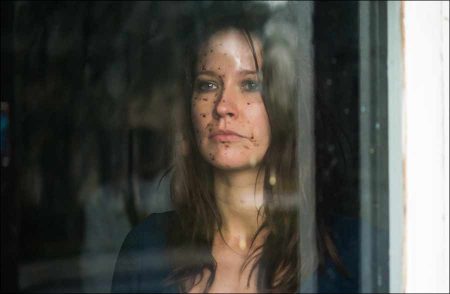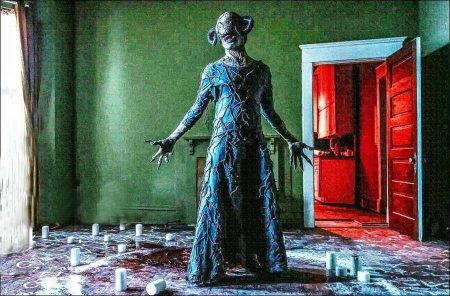
Taglines: Some mistakes are better left in the dark.
From Black movie storyline. “From Black” begins as a policewoman steps into an unoccupied house. A 911 call plays on the soundtrack. “I just stabbed somebody,” whispers a voice on the line. “I have to get out…” she stammers.
Meanwhile, the police officer continues surveying the house. “Ma’am, are you still there?” The string section throbs. “I can’t get out. It could still be here…”
The strings peel as the slow-moving visitor enters another room. The floor’s littered with candles, surrounding a ritualistically carved circle. Something happened here. You can tell from all the blood. Or the partly opened door that the woman walks towards. Or the strings, which continue to drone and strain with alarm.
The music stops right as Sergeant Bray (Jennifer Lafleur) pushes two doors open into the next room. There’s more blood inside, this time on a white sheet covering the couch and a nearby armchair. In a moment, we meet the house’s owner, a grieving mother and former addict, played by Anna Camp. “Her name is Cora Lowen,” says another cop in the next scene and from inside a local police station. And to be clear, while that is Cora’s house, “it’s someone else’s blood.”
“From Black” toggles between the police station and wherever Cora goes before she paints her house red. She’s a childless parent, so it soon becomes obvious what really happened here: Cora conjured a demon to bring her young son Noah (Eduardo Campirano) back from the dead. Bray focuses on why Cora did it, but there’s not much to the trite and often generic answers provided by writer/director Thomas Marchese, a former police officer, and his co-writer Jessub Flower.
“From Black” asks and answers its question with every plodding step its characters take. Grief, like trauma, is the theme, so it’s unsurprising that Cora’s story is ostensibly dreadful, though turgid. Over time, she bonds with Abel (John Ales), who leads a support group for the aggrieved. Abel eventually suggests an unconventional way for Cora to reunite with Noah. As you might guess, Abel’s scheme does not go to plan.
Cora, wallowing in her grief, only retrospectively confirms what Bray already knows, given her righteous skepticism. When one of Bray’s colleagues suggests that Cora’s probably back on drugs, there’s a long, heavy pause before Bray says, “Maybe.” She obviously has her doubts, and there’s no time nor any good reason to doubt Bray, given the movie’s constant shuffling back and forth between the pre-ritual past and Cora’s present investigation. What Lafleur’s character ultimately finds is a given. Besides, we don’t need closure since the rest of the movie essentially proves the futility of looking for it.
In a director’s statement, Marchese says that Cora’s behavior reflects the sort of desperate behavior that he often encountered during his time “working narcotics.” Maybe that was the filmmaker’s goal, but Cora and her world are never life-like. She’s the kind of impoverished skid row character whose character is defined by the junk piled outside of her rundown home, not to mention her deadbeat ex Wyatt (Travis Hammer), who can’t get his act together or leave Cora alone. Hammer dutifully hams it up, but there’s nothing dramatically essential about his character’s slurred epithets and lingering presence.
Then again, Wyatt’s unconvincing for the same reasons that Cora and Abel are too obvious in their derangement. Portentous line readings are underscored, bolded, and italicized by bad direction, leaden symbolism, and a pushy score. You never have to wonder or try to understand what the characters are feeling because they never stop telling you how to feel. The answer, invariably, is sad and fearful, but “From Black” is neither, really.
Marchese and Flower constantly refer to sweeping emotions and realistic details that their stillborn mood piece never really locates. There’s a slow-motion dream sequence where Noah tries and fails to escape a burly kidnapper (Ritchie Montgomery), who hauls the kid into his van while Camp screams silently in the middle of the road. There are also a few scenes of spellcraft gone awry, including some levitating, heavy breathing, and demonic rasping. “Pain is all that remains,” says a mysterious presence.
From Black (2023)
Directed by: Thomas Marchese
Starring: Anna Camp, John Ales, Jennifer Lafleur, Travis Hammer, Eduardo Campirano, Ritchie Montgomery, Kenneth Ford, Alicia S Mason, Ian Casselberry, Aerial Nicole, Sacha Poppy Toche
Screenplay by: Jessub Flower, Thomas Marchese
Production Design by: Julie Toche
Cinematography by: Duncan Cole
Film Editing by: Keara Burton
Costume Design by: Chloée O’Hayon-Crosby
Set Decoration by: Dayton Douglass
Makeup Department: Melissa Oteri
Music by: Luigi Janssen
MPAA Rating: None.
Distributed by: Shudder
Release Date: April 28, 2023
Views: 59





